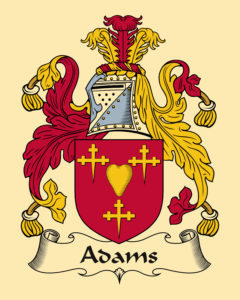
We sell our products exclusively on Amazon so you can buy with confidence knowing you are protected by Amazons no hassle return policy and our 4.9 star lifetime seller rating with over 2000 reviews. Items featuring a family crest make great gifts, whether for yourself or that hard to buy for family member, friend or co-worker.
We also sell customized license plates (add your own image and text). customizable mugs and license plates for military veterans, classic art on mouse pads and posters, a wide variety of flag license plates for nations around the world as well as pride flags and Native American tribal flags. Click here to go to our Amazon Store front.
We sell Mugs, Plaques, Prints, Ceramic Tiles, Coasters, Garden Flags, License Plates and Mouse Pads featuring The Adams Coat of Arms. Click the image to go to Anglo/Irish names A section of our Amazon store.
Etymology
The surname “Adams” is of significant historical interest, tracing its roots back to the given name “Adam.” This name is derived from the Hebrew word “אדם” (Adam), meaning “man” or “earth,” reflecting the biblical first man created by God according to Judeo-Christian tradition. The name Adam became popular in Christian Europe, particularly after the Norman Conquest of England in 1066, when it was introduced by the Normans. The surname “Adams” thus typically means “son of Adam,” indicating a patronymic origin.
Etymology and Origin in England
In England, the use of “Adams” as a surname can be traced back to the medieval period. It was common practice to adopt a father’s given name as a surname, leading to the creation of surnames like “Adamson,” “Adams,” or simply “Adam.” The earliest recorded use of the surname “Adams” in England appears in the late 13th and early 14th centuries. One of the earliest references is in the “Subsidy Rolls” of Worcestershire in 1327, where an individual named “Richard Adams” is listed. The widespread use of the surname in England can be attributed to the popularity of the personal name Adam during this time.
Presence in Ireland
The surname “Adams” also appears in Irish records, though its origins there are often associated with English settlers or Anglo-Irish families. The introduction of the surname into Ireland can be linked to the Norman invasion of Ireland and subsequent English colonization. Many Anglo-Norman families, who bore names like Adams, settled in Ireland, particularly during the Tudor and Stuart periods when English and Scottish plantations were established. In Ireland, the name Adams has been found in counties such as Dublin, Antrim, and Down. It became associated with Protestant settlers, often linked to the Anglo-Irish aristocracy and landed gentry.
Arrival and Usage in the United States
The surname Adams became prominent in the United States with the early English colonists. One of the most notable bearers of the name was John Adams, a Founding Father and the second President of the United States. His lineage traces back to Henry Adams, an early settler in Braintree, Massachusetts, who emigrated from England in the early 17th century. The Adams family became a prominent political dynasty in the United States, producing several significant figures, including John Quincy Adams, the sixth President.
The surname Adams in the United States is often of English or Anglo-Irish origin, though it has also been adopted by other ethnic groups. African Americans, for instance, may bear the surname Adams, which could have been taken from former slaveholders or chosen during the period of emancipation and afterward.
Spelling Variations
The surname Adams has several variations, reflecting regional dialects, phonetic spellings, and clerical recording errors. Some common variations include:
- Adam: A shorter form that might indicate the same patronymic origin.
- Addams: An alternative spelling, sometimes used interchangeably with Adams.
- Adamson: Literally meaning “son of Adam,” this variant explicitly retains the patronymic origin.
- Adamsen: A variant found in Scandinavian countries, influenced by local naming customs.
- Adames: A variation that might appear in Hispanic or Latin American contexts.
- McAdam: A Scottish variant, meaning “son of Adam,” with the Gaelic prefix “Mc.”
These variations often arose from local linguistic influences or errors in historical records. The surname Adams, while relatively stable, has seen changes that reflect the evolution of languages and the movement of people across regions.
Conclusion
The surname Adams, with its roots in the biblical name Adam, is a widespread and historically rich surname. Its presence in England dates back to the medieval period, with subsequent migration to Ireland and the United States. The name has been borne by notable figures, particularly in the context of American history. The variations of the name reflect the diverse paths it has taken across different cultures and languages. Whether spelled as Adam, Addams, or Adamsen, the surname continues to be a common and significant identifier for many families around the world.